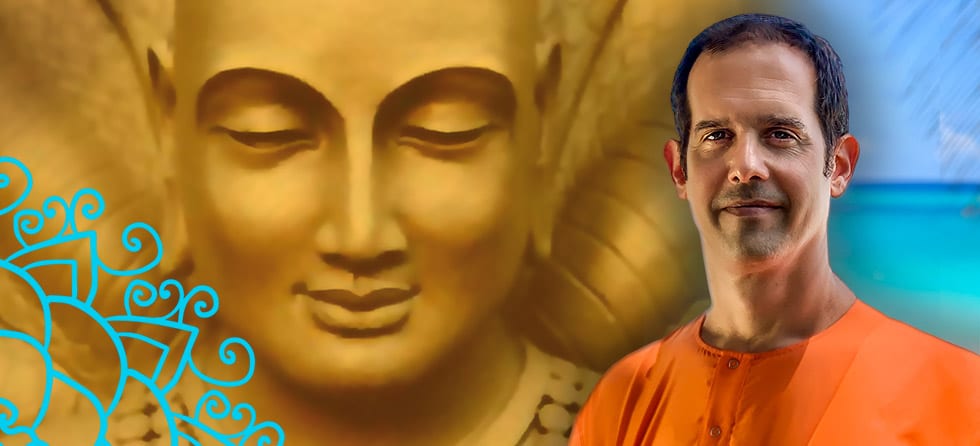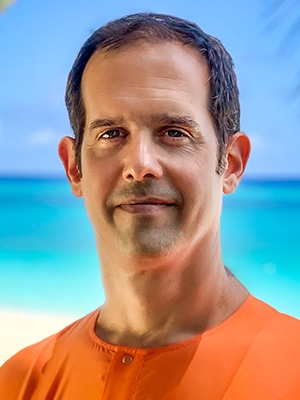
Patanjali Yoga Sutras: Practical Guide
8 WEEKLY SESSIONS, Tuesdays, 7:00-8:30pm EST
Date & Time: Offered as 8 weekly sessions on Tuesdays, Nov 24, Dec 1, 8, 15, 22, 29, Jan 5 & 12, 7:00-8:30pm EST
Hours: 12 hours
What You’ll Learn:
- Enhance your meditation practice – gain practical teachings from the most authoritative Yogic scripture on meditation to enhance your own practice. The course will focus on the portions of the Patanjali Yoga Sutras which are practice-oriented.
- Yoga Philosophy – gain a thorough understanding of the teachings of the Patanjali Yoga Sutras.
- Yoga Psychology – learn in-depth knowledge of the workings of the mind and powerful techniques of how to purify it, attain wisdom and abiding peace.
Course Description:
In this course, Swami Brahmananda will be teaching key sutras that contain practical guidelines to enhance the meditation practice, through the cultivation of pure qualities, establishing the posture, breath, control of the senses, and finally cultivation of concentration, meditation, and wisdom.
This is an inspiring and thorough study of the most important text for the yogis. You will learn practical tools to improve your own meditation practice and your spiritual journey.
Raja Yoga, the royal path of mind control, is the most comprehensive and scientific approach to God-Realization. The precepts and doctrines of this ancient science were first compiled and explained by Patanjali Maharishi, the greatest psychologist of all time. Never has man’s mind been so completely analyzed. Never has the process of eliminating human suffering been so succinctly presented. The methods of Raja Yoga are profound and timeless. They are the most useful techniques available to modern man beset by the tremendous stresses and strains of our competitive society.
Course’s schedule:
Lesson 1:
- The disease of samsara – cyclic suffering. The cause – ignorance. The remedy – Yoga or clarity of perception – samyaga darshana. The healthy state – Kaivalya or liberation
- The 5 kleshas or roots of suffering:
- Avidya – ignorance of the true nature of the self
- Asmita – egoism – identification with the instruments of knowing
- Raga – attachment and desire for pleasure
- Dvesha – aversion for pain
- Abhinivesha – fear of death, or clinging to physical embodiment
- Future suffering should be avoided by changing our relationship to painful past impressions and adhering to dharmic actions in the present
- Ashtanga Yoga – the yoga of eight limbs
- The Yamas – restraining the impulses of the kleshas:
- The first Yama – ahimsa or non-violence
Practices
- Establish the posture – visualization of the mountain
- Meditation to cultivate divine qualities – ahimsa
- Concentration on the breath
- Meditation on OM
Lesson 2:
- The definition of Yoga as the restraining of the modifications (vrittis) in the mind (chitta)
- Attainment of Samadhi by self-surrender to Iswara
- Iswara – the Purusha who is beyond klesha or suffering, desires and karma – action and fruits of pleasure and pain, the teacher of all teachers
- Iswara and OM
- The Yamas – restraining the impulses of the kleshas:
- The second Yama – Satyam or truthfulness
Practices
- Establish the posture – visualization of the mountain
- Meditation to cultivate divine qualities – Satyam
- Concentration on the breath
- Meditation on OM
- Self-analysis
- Spiritual diary
Lesson 3:
- The obstacles to meditation and their manifest symptoms (vikshepas).
- The means to overcome the obstacles:
- Meditation on OM.
- Meditation on one aspect of the truth.
- The Yamas – restraining the impulses of the kleshas:
- The third and fifth Yamas – Asteya – non stealing and Aparaigraha – non greed
Practices
- Meditation to cultivate divine qualities – Asteya and Aparigraha
- Concentration on the breath
- Meditation on OM
- Self-analysis continued
- Spiritual diary continued
Lesson 4:
- The restraining of the vrittis in the chitta is by Abhyasa and Vairagya:
- Abhyasa – defined as long, steady and inspired practice
- Vairagya – non attachment – its definition and how is it practically cultivated
- Pratyahara – withdrawal of the senses
- Dharana – concentration
- The Yamas – restraining the impulses of the kleshas:
- The fourth Yama – Brahmacharya – control of the senses and continence
Practices
- Meditation to cultivate divine qualities – Brahmacharya
- Concentration on the breath
- Meditation on OM
- Self-analysis continued
- Spiritual diary continued
Lesson 5:
- The operations of Karma:
- Sanchita or accumulated karma
- Prarabdha or present life karma
- Agami – freshly created karma
- The subconscious forces of samskaras and vasanas
- Adherence to dharma as restraint of vasana
- Pratipaksha Bhavana – the positive always overcomes the negative
- Autosuggestions to purify the subconscious mind
- The Niyamas – establishing pure, Yogic habits:
- The first Niyama – Saucha – cleanliness and purity
Practices
- Meditation to cultivate divine qualities – Saucha
- Concentration on the breath
- Meditation on OM
- Self-analysis continued
Lesson 6:
- Kriya Yoga:
- Tapas – the practice of self-control
- Swadhyaya – study of scriptures dealing with liberation
- Iswara Pranidhana – self-surrender to God
- Iswara Pranidhana – self surrender to God as Karma Yoga:
- Actions aligned with Yamas and Niyamas (dharma)
- Offering of one’s actions and fruits to God
- Iswara Pranidhana as the practice of Bhakti Yoga – devotion to the chosen Divinity
- Puja and Arati
- Prayer
- The Niyamas – establishing pure, Yogic habits:
- The second Niyama – Santosha – contentment
Practices
- Meditation to cultivate divine qualities – Santosha
- Concentration on the breath
- Meditation on OM
- Introducing the practice of Karma Yoga
- Introducing the practice of Puja and Arati
Lesson 7:
- Devotion to the Ishta Devata – chosen Divinity:
Introducing the Kaivalya Mantras on the forms of the Divine and how to meditate with them - Pranayama – control of the vital energy
- Pratyahara – the withdrawal of the senses
- Dharana, Dhyana and Samadhi – concentration, meditation and the superconscious state
Practices
- Meditation to cultivate divine qualities – patience
- Concentration on the breath
- Meditation on chosen Deity mantra
Lesson 8:
- Attaining clarity of mind by meditating on the four virtues:
- Maitri – friendliness
- Karuna – compassion
- Mudita – good will
- Upeksha – non-interest in others’ faults
- Summary of the practices
Practices
- Meditation to cultivate divine qualities – Maitri
- Concentration on the breath
- Meditation on chosen Deity mantra
Additional Information:
This program is offered live through Zoom webinar with the availability for students to interact through Q&A with the presenter.
For enrolled students, a video recording will be available after each class in the event you miss a class or would like to review the content.
It is possible to register and take the course at any time. You can catch up on any classes you miss with the recordings.
Requirements & Recommendations:
- No experience necessary. This program is open to beginners as well as advanced practitioners.
- Viewing Device: Desktop or laptop computer will provide the best experience, although you can also connect via a tablet or smartphone.
- Internet connection: High-speed broadband wired or wireless is best.
- Video: Download Zoom to your computer, or install the Zoom app to your device. For interactive group sessions, a webcam or integrated camera will allow others to feel more connected with you.
- Audio: Headphone speakers are recommended. If you wish to participate vocally, a headset with a microphone will be ideal.
Course Includes:
- 8 live sessions of 1.5 hours of study from the Patanjali Yoga sutras and guided practices
- Recordings of the live sessions
- Course manual
- Home guided practices – including recorded guided meditations
- Feedback and guidance on student’s home practices
- Availability to ask questions about the studies and practices between classes

Swami Brahmananda is Manager of the Sivananda Ashram Yoga Retreat and senior staff of the Sivananda organization. A long-time practitioner of yoga, he regularly teaches yoga philosophy and meditation for the Sivananda Yoga Teacher Training Courses as well as meditation immersion courses. He is a much-loved, inspiring, and knowledgeable teacher.
Let's Stay In Touch
Join our email list to learn more about our in-person and online programs, courses, and free events.







